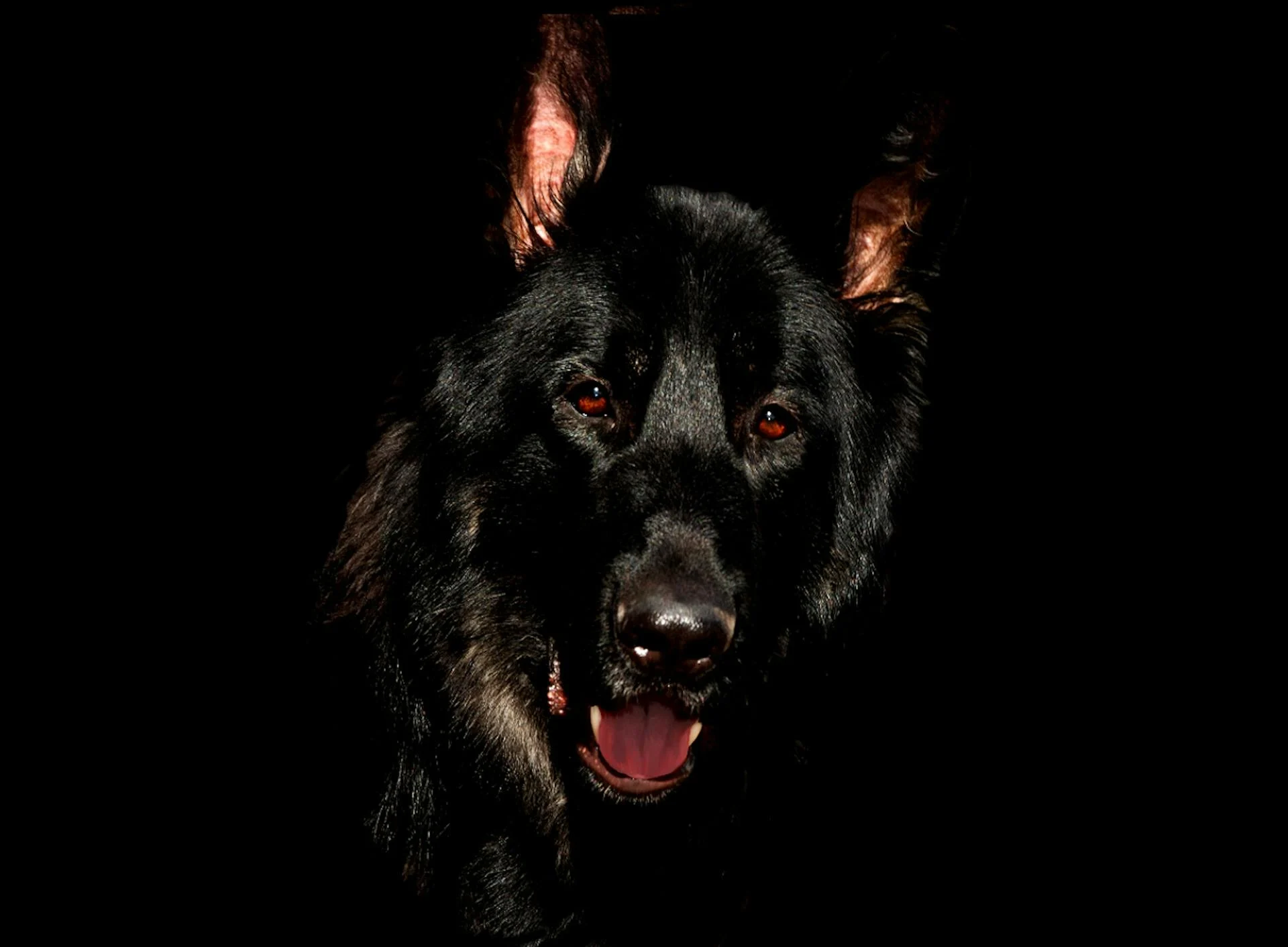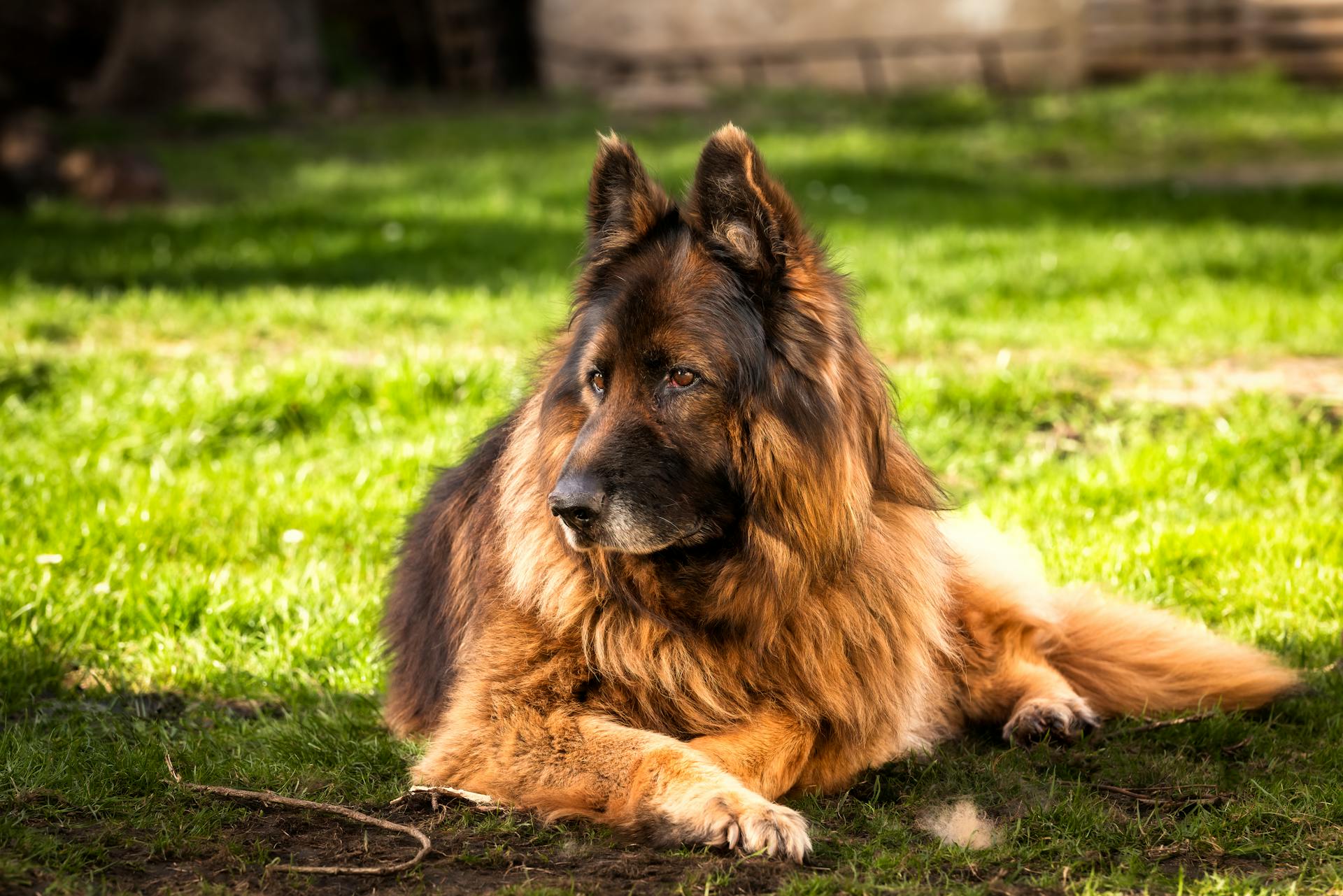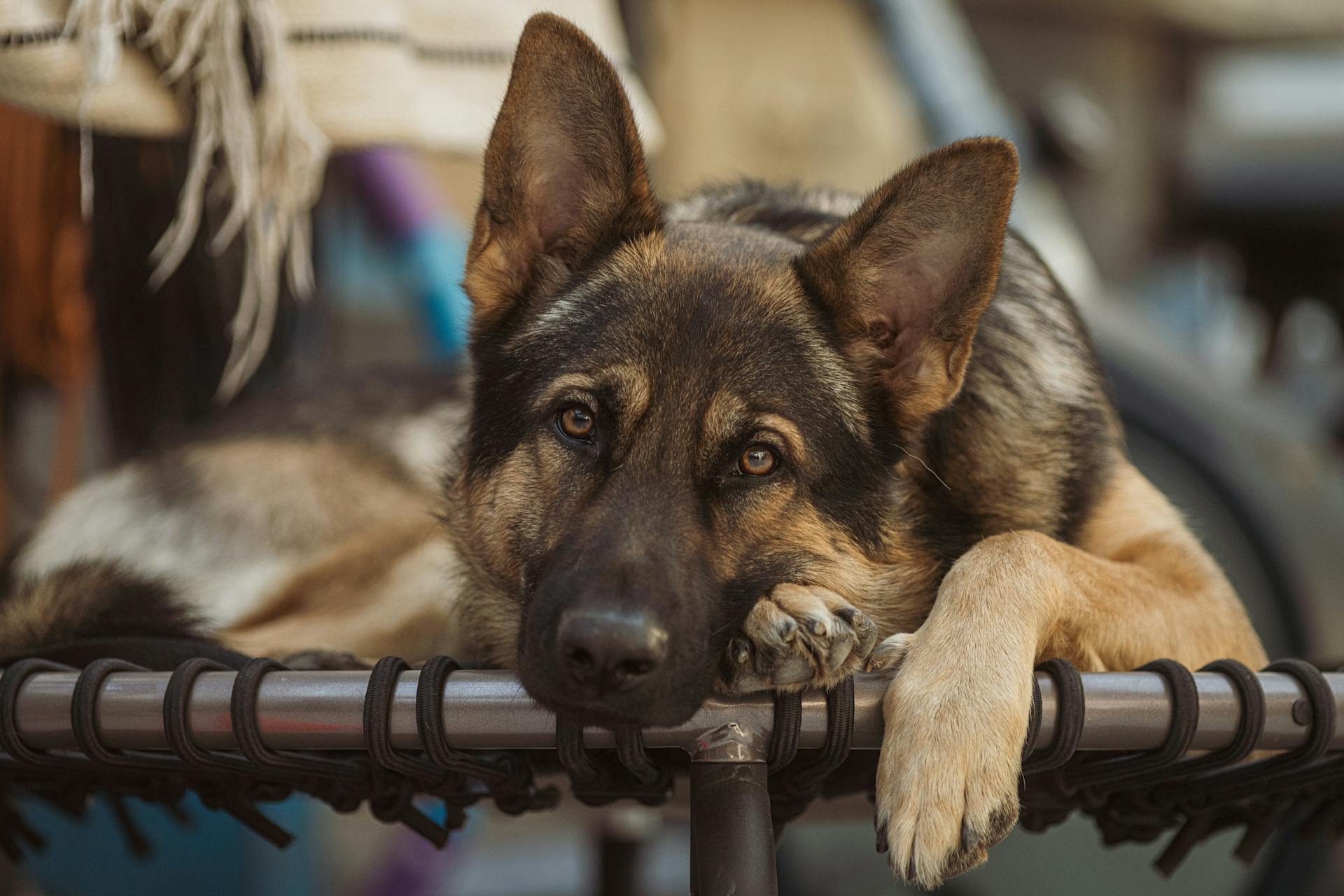
The Sable German Shepherd breed is a stunning variation of the classic German Shepherd, characterized by its distinctive coat color.
Their coat is a beautiful blend of black and tan, with a mix of black and dark brown hairs giving it a rich, dark appearance.
Sable German Shepherds have a medium-length coat that requires regular grooming to prevent matting and tangling.
They are highly intelligent and active dogs that need plenty of exercise and mental stimulation to prevent boredom and destructive behavior.
You might enjoy: All Black German Shepherds
Physical Characteristics
The Sable German Shepherd is a stunning breed, and one of its most striking features is its coat color. Sable German Shepherds have a coat color that ranges from light tan to darker shades of red or brown, with individual hairs displaying various shades, giving them a beautiful and striking appearance.
Their body structure is strong and muscular, with a slightly elongated body and a distinct outline. They have a well-proportioned build, which is typical of standard German Shepherds.
Their tail is a bushy and slightly curved affair, reaching down to their hocks when at rest. It's an extension of their spine and is often held low when they're relaxed, but may be raised when they're alert or excited.
Their ears are erect and pointed, contributing to their keen sense of hearing. This allows them to quickly detect sounds in their environment.
Sable German Shepherds have a smooth and efficient gait, characterized by balanced movement and powerful strides. Their movement is often described as fluid and effortless, allowing them to cover ground quickly and efficiently.
Here are some key physical characteristics of the Sable German Shepherd:
Males typically weigh between 75 to 95 pounds and stand up to 26 inches tall, while females are slightly smaller, weighing between 55 to 73 pounds and standing no taller than 24 inches.
Temperament and Behavior
Sable German Shepherds are extremely loyal and family-oriented dogs, always believing their job is to protect their family. They have a natural protective instinct and are known to be alert and watchful, sometimes barking if they feel like they're in danger.
Proper socialization is crucial for a German Shepherd, especially around young people, to ensure they can interact with the family properly. Socialization helps them understand what behaviors are desirable and prevents destructive behaviors.
Sable German Shepherds are highly intelligent and need a lot of mental stimulation, which can be achieved through training and exercise. They thrive on having a specific job to do, especially with their owners, making them happiest when close to their human family.
They are not ideal for owners who are away from home frequently, as they can become bored, frustrated, and even aggressive if left alone for extended periods. Close companionship is a must with the breed.
Sable German Shepherds are highly trainable and can be gentle and affectionate companions, particularly towards children, with proper socialization from an early age. They are also excellent watchdogs, always ready to alert their owners to any potential dangers.
Their powerful prey drive means they need early socialization and expert training in homes with smaller pets. They generally get along with other dogs, but may need to be socialized early to get along with the family cat.
Suggestion: Dog Training in German Language
Health and Care
Sable German Shepherds are generally a healthy breed, but like any large dog, they can be prone to certain health issues.
One of the most common health problems for Sable German Shepherds is joint issues, specifically hip and elbow dysplasia, which can cause pain and lameness.
Regular check-ups with a vet can help catch these issues early on, and responsible breeders will often provide health clearances for both parents to reduce the risk of these problems.
Gastric dilatation-volvulus, or bloat, is another condition to watch out for in Sable German Shepherds, especially after eating large meals quickly or engaging in vigorous exercise.
To prevent bloat, feed your dog two to three small meals a day, and make sure they eat slowly.
Here are some common health issues to be aware of in Sable German Shepherds:
- Hip and elbow dysplasia
- Degenerative myelopathy
- Gastric dilatation-volvulus
Health and Conditions
Sable German Shepherds are generally a healthy breed, but like any large breed, they can be prone to certain health issues.

One of the most common health problems is joint issues, specifically hip and elbow dysplasia. This is a condition where the joints don't form properly, leading to pain and mobility issues.
Regular check-ups with a veterinarian can help catch these issues early on. A reputable breeder will also provide health clearances for both parents, reducing the risk of inherited conditions.
Large breed dogs like Sable German Shepherds are also at risk for gastric dilatation-volvulus, also known as bloat. This can be caused by eating large meals too quickly, leading to a build-up of gas in the stomach that can twist and cut off blood flow.
To prevent bloat, it's essential to feed your Sable German Shepherd two to three small meals a day, and to avoid eating after vigorous exercise.
Some other health concerns to be aware of include obesity and allergies. These can be managed with a healthy diet and regular exercise.
Here are some common health issues to watch out for in Sable German Shepherds:
- Hip and elbow dysplasia
- Degenerative myelopathy
- Gastric dilatation-volvulus
- Obesity
- Allergies
Food & Diet
When feeding your German Shepherd Sable, it's essential to provide a specially formulated diet for large breeds. They need around 3 cups of high-quality dry kibble per day.
Their diet should be divided into two or three meals, depending on their age, energy levels, and size. You should consult the manufacturer's instructions to check the exact amount that you need to feed them.
Their food should have an animal-based protein as the first listed ingredient, and be free from filler ingredients like wheat, corn, and soy. This will ensure they get the nutrients they need.
Substituting dry food with canned wet food or lean meats and organ meats can add variety and give an amino acid and protein boost. Look for food with at least 30%–40% protein content and around 20% fat.
Large breeds like the German Shepherd Sable are prone to joint issues, so be careful not to overfeed them. Avoid giving them too many treats or table scraps.
Giving them a diet rich in healthy oils can aid their joint health and help them thrive. This will keep them happy and healthy for years to come.
For another approach, see: Different Types of German Shepherd Dogs
AKC Standard
The AKC Standard for German Shepherds is quite specific when it comes to their coat color. The American Kennel Club prefers strong, rich colors over pale or washed-out ones. Pale, washed-out colors and blues or livers are considered serious faults.
A white German Shepherd is actually disqualified from being certified. This is because the AKC values appearance over health, which can lead to issues with the breed's overall well-being. I've seen this firsthand in some German Shepherds that are too focused on appearance.
The AKC doesn't have specific restrictions on sable German Shepherds, but they do prefer darker sable coats over lighter ones. This is indicated by their disqualification of washed-out colors.
Here are the AKC's preferred colors for German Shepherds:
- Strong, rich colors
- Dark sable coats
Keep in mind that the AKC's standards can be argued as prioritizing appearance over health. It's essential to consider the potential health implications when breeding German Shepherds.
Grooming
Grooming is an essential part of owning a Sable German Shepherd. They have a thick double coat that sheds moderately all year round and heavily at the change of seasons, so be prepared for a lot of hair around the house.
Regular brushing is a must to remove loose fur and minimize shedding. Aim for at least two or three times a week, especially when they're shedding heavily. This will keep their coat smooth and healthy.
Daily brushing is necessary for Sable German Shepherds with long hair to prevent knots and tangles from forming. If your dog has medium-coated hair, you can get away with brushing them twice a week.
Brushing their teeth regularly will prevent dental decay and gum disease. You can also give them dental chews every day to help keep their teeth clean. Don't forget to check their erect ears for dust and dirt.
Here are some grooming tasks to keep in mind:
- Brush regularly: at least two or three times a week
- Bath as needed: use dog shampoo and wash off completely
- Trim nails: every few weeks to prevent overgrowth
- Clean ears: regularly with a damp cloth or dog ear cleaner
- Dental care: brush teeth regularly with dog toothbrush and toothpaste
Investing in a pet vacuum cleaner might be a good idea to keep up with the shedding. And remember, don't use human soap or shampoo on your Sable German Shepherd, as it can strip their coat of natural oils.
Buying and Owning
Buying a sable German Shepherd requires careful consideration of their high energy levels and need for regular exercise. They need plenty of physical and mental stimulation to prevent boredom and destructive behaviors.
If you're thinking of buying a sable German Shepherd, make sure you have an active lifestyle that can provide them with the exercise they need. They thrive in households that provide plenty of exercise and mental stimulation, making them suitable companions for outdoor activities such as hiking, jogging, and agility training.
It's also essential to understand that sable German Shepherds are highly protective of their owners, which can lead to aggressive and territorial behavior at times. They may have a strong prey drive, which can lead to chasing small animals or even children if not properly trained and socialized from an early age.
To give you a better idea of what to expect, here are some key factors to consider when buying a sable German Shepherd:
- High energy levels and need for regular exercise
- Highly protective and potentially aggressive behavior
- Strong prey drive and need for proper training and socialization
- Need for consistent routine and firm leadership
Buy Puppies
If you're considering buying a German Shepherd puppy, you need to think about the massive responsibility that comes with owning one of these animals.
You should be aware that German Shepherds are highly protective of their owners, which can lead to aggressive and territorial behavior at times.
Hayes Haus has been breeding sable German Shepherd puppies for over a decade, and they've been sold to loving homes across America.
A German Shepherd is not the kind of dog that can be left at home alone for long periods, as this will quickly lead to destructive and even aggressive behavior.
Good training and socialization are essential with owning a German Shepherd, and they do best with a specific job to do.
You might enjoy: German Shepherds Aggressive
Cost
When considering the cost of a Sable German Shepherd puppy, it's essential to think about more than just the initial price tag. A recommended read on the true cost of German Shepherd puppies can help you prepare for the expenses that come with owning a dog.
For more insights, see: German Spitz Cost
The price of a Sable German Shepherd can vary greatly, depending on factors such as lineage, pedigree, health, and the reputation of the breeder. On average, you can expect to pay anywhere from $500 to $2500 for a Sable German Shepherd puppy from a reputable breeder.
Some breeders may charge different prices for different coat colors, which can be a red flag if they're prioritizing looks over temperament. Be wary of breeders who breed solely for appearance, as this can lead to unhealthy or unstable dogs.
A Sable German Shepherd puppy can cost anywhere between $800 and $1500, while a standard German Shepherd puppy is generally cheaper, ranging from $300 to $700.
You might enjoy: German Wirehaired Pointer Breeder
Puppies
Buying a puppy is a big decision, and it's essential to consider the responsibilities that come with it. German Shepherd puppies, like any other breed, require a lot of time, patience, and dedication.
You should be aware that German Shepherds have a strong protective instinct, which can lead to aggressive behavior if not properly trained and socialized. They are highly devoted and loyal animals, but they need a firm hand and consistent routine to train successfully.
Sable German Shepherd puppies, in particular, require socialization to adapt well to various environments. It's crucial to expose them to new situations early on to help them distinguish friends from foes.
German Shepherds have a powerful prey drive, so it's essential to introduce them to different animals and expose them to various environments to help them navigate the unknown safely. This experience will instill confidence and teach them that unfamiliarity doesn't always pose a threat.
With proper training and socialization, German Shepherds can learn openness and tolerance towards others. However, it's crucial to understand that they are not the kind of dog that can be left at home alone for long periods, as this can lead to destructive and even aggressive behavior.
Owning Essentials
To ensure you're prepared for the responsibilities of owning a Sable German Shepherd, it's essential to consider their high energy levels, requiring plenty of physical and mental exercise to prevent boredom and destructive behaviors.
Regular grooming is also a must, as they have a double coat that sheds year-round, requiring regular grooming to manage shedding.
A confident and assertive leadership style is necessary, as they thrive in households with a clear hierarchy and may exhibit dominant behaviors if they sense inconsistency or weakness.
Here are some key things to consider when planning your Sable German Shepherd's exercise routine:
A Sable German Shepherd's strong prey drive can lead to chasing small animals or even children if not properly trained and socialized from an early age, making it crucial to prioritize socialization and training.
Verein für Deutsche Standard
If you're considering bringing a German Shepherd into your family, it's essential to understand the breed standards set by the Verein für deutsche Schäferhunde (German SV Standard). Founded in the late 1800s, the German SV is Germany's governing body for German Shepherd breed standards.
They categorize the German Shepherd Dog by the shade of their coat rather than the pigment 'color'. This means that instead of being labeled as silver, black, or blue, German Shepherds are classified based on their sable coat colors.
The German SV breaks down the sable German Shepherd breed standard into three classifications: light sable, medium sable, and dark sable.
Popular Names

Buying a home is a big decision, and one of the first things to consider is the neighborhood. According to the article, the most popular names in the area are often a good indicator of the local culture and lifestyle.
Emily and Michael were the top names in 2020, followed closely by Olivia and Noah. These names have been consistently popular over the past few years, suggesting a strong sense of tradition in the community.
In fact, the top 10 names in 2020 accounted for over 50% of all births in the area, highlighting the strong influence of these names on local culture.
A fresh viewpoint: How Strong Are German Shepherds
Featured Images: pexels.com


